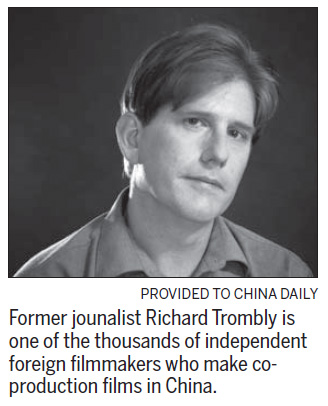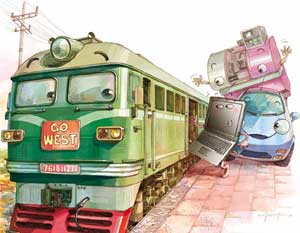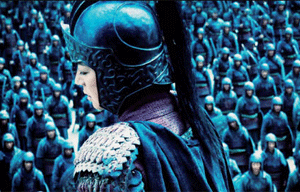It takes two to tango
Updated: 2011-10-28 09:26
By Wang Chao (China Daily)
|
|||||||||
"Distributors never thought that China could surpass Germany, France and Japan, and become the largest overseas market in terms of collections for Avatar, behind North America. That's why the crew of Transformers: Dark of the Moon flew to China specially to promote the film earlier this year."
After Bertolucci, co-production of films went into hibernation until the 1990s, when the TV series Shaolin Temple was shot in Henan province along with Hong Kong partners. But at that time, policies towards partners were very stringent and the Hong Kong side had to revise storylines and characters in accordance with mainland requirements.
The real surge for co-production of films started in 2004 when the government lowered the standards. Under the norms, for co-production films, only some scenes need to be shot in China, while Chinese actors/actresses should make up just one-third of the star cast. Adherence to these norms helps the movie to be classified and screened as a domestically produced venture.
Europe connection
Besides co-producing films with Hollywood, China has also teamed up with filmmakers from the United Kingdom, Italy, New Zealand and Australia. But most of the co-production ventures are still between mainland and Hong Kong filmmakers. Foreign partners only account for 10 percent to 20 percent of the total, although the number is growing quickly.
"The worldwide trend is co-production, since films are essentially international products," Yin says. "Nowadays most Hollywood films are co-produced. By this way it can also take advantage of local resources like distributors and cinemas."
With co-productions surging, some foreign companies are not just satisfied with individual alliances and rather prefer to establish joint-venture companies that are dedicated to co-production films in China.
|
|
In August Hollywood production house Legendary Entertainment teamed up with Chinese media company Huayi Brothers Media Corporation to set up Legendry East. The two companies said in a statement that the new venture will produce English films that draw on Chinese ties.
During the same month, another Hollywood company Relativity Media LLC signed an agreement with SkyLand, a China-based production venture, to release several Relativity films including Immortals and a fairy tale about Snow White starring Julia Roberts.
Experts compare this move to "moving the Hollywood school to the front door".
"We can learn mature production systems from Hollywood and other Western film companies," Deng says. "For example, Hollywood has a very clear division of script writers - some write dialogues and some write stories. But in China, these career paths are not clearly defined. I am confident that gradually we will also pick up these nuances."
Huge potential
It is not just the big studios that are in the China film mart. Several small and independent producers are also vying with each other to grab a slice of the huge pie.
Former journalist Richard Trombly was one of those who decided to leave his fourth estate career for a stint with the camera. Starting off as a scriptwriter, he launched his movie career with a co-production called Waiting in 2008. The film narrates the stories of left-behind children of migrant workers in China. The film was screened at various film festivals and then sold to a foreign website.
"Thousands of independent foreign filmmakers like me are making co-production films in China," he says. "We don't think the mainstream market here will accept our work, plus I don't have the money, like the big studios have, to promote it. So most of the time I sell my work to the foreign market. If it receives good comments or wins awards, they can be brought back to China at a flat-rate."
Trombly, however, says that he is not sure whether co-production films will win in both the foreign and the Chinese market at the same time, be it the small-budget films or Hollywood blockbusters.
"There are so many restrictions - you cannot touch some topics, and you are not allowed to show bloody scenes or nudity, which can prove fatal for many films."
For such films the only route left is the string of film festivals across the world.












